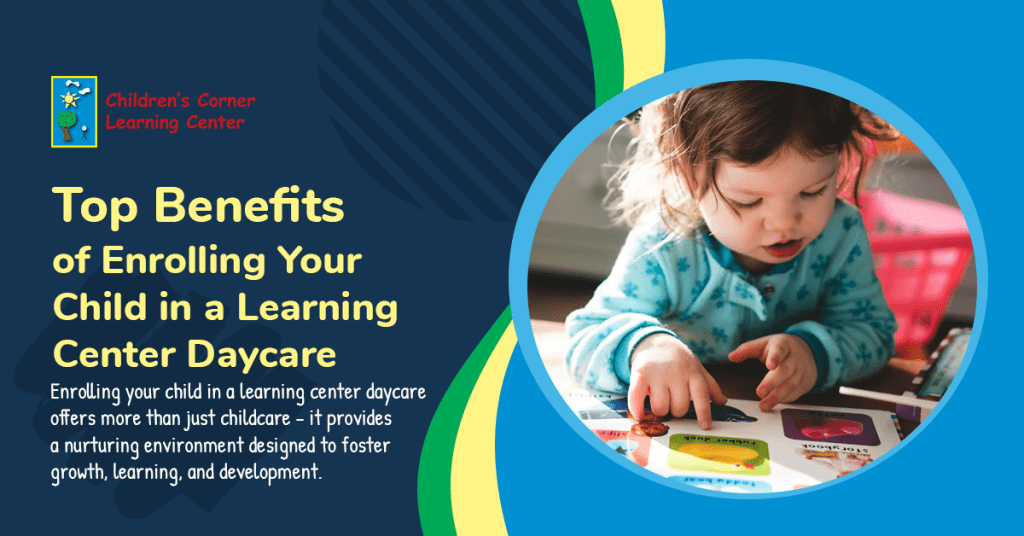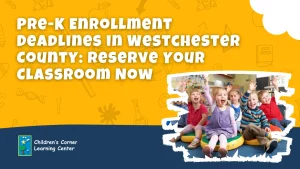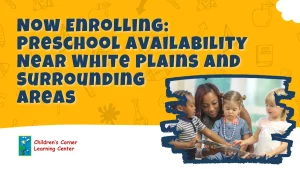Enrolling your child in a learning center daycareoffers more than just childcare—it provides a nurturing environment designed to foster growth, learning, and development. Unlike traditional daycare settings, learning center daycares focus on balancing care with educational activities, helping children build essential skillsfor future success. From social interaction to early academic foundations, these centers provide structured programs tailored to each child’s age and needs.
At Children’s Corner Learning Center, we understand the importance of giving your little one a strong start in life. In this guide, we’ll explore the top benefits of choosing a learning center daycare, showcasing how it can enrich your child’s early years and prepare them for a bright future.
Building Foundations With Early Education Programs
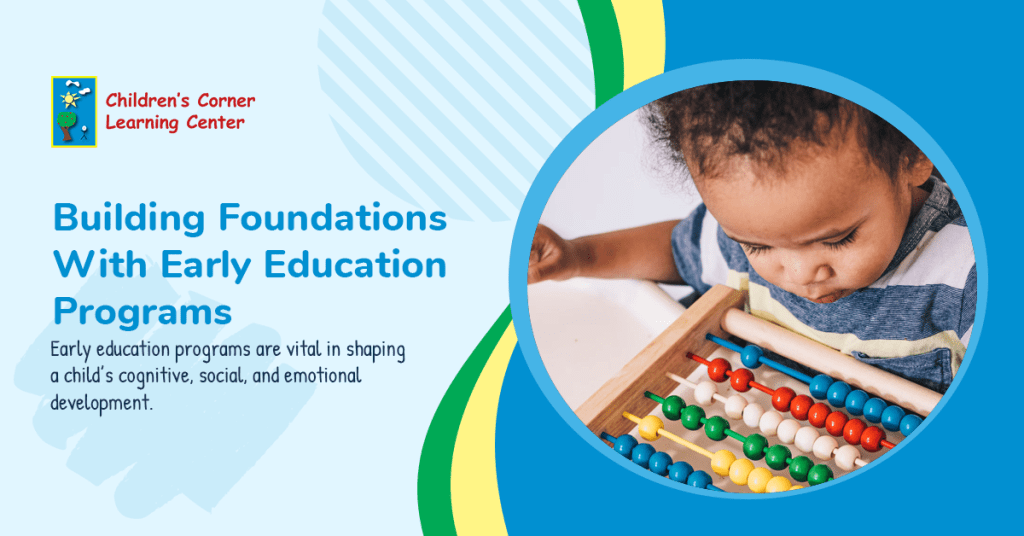
Early education programsare vital in shaping a child’s cognitive, social, and emotional development. They are designed to provide structured learning experiences that help children build essential skills during their formative years. Early education programs create a strong foundationfor lifelong success by fostering curiosity, creativity, and confidence.
How Early Education Programs Enhance Cognitive Skills
One key goal of early education programs is to stimulate cognitive development. These programs introduce activities that challenge young minds and encourage problem-solving and creativity in a supportive environment.
Some effective strategies include:
- Interactive play materials: Toys like puzzles, blocks, and matching games help improve logical thinking and fine motor skills.
- Language-rich environments: Activities like storytelling, singing, and conversations expand vocabulary and comprehension.
- Sensory exploration: Hands-on experiences with materials like water, sand, and clay stimulate curiosity and discovery.
These elements work together to nurture a child’s ability to think critically and confidently explore their world.
Developing Social Skills Through Group Activities
Early education programs also focus on helping children build strong social skills. Group activities allow children to interact with peers, practice communication, and develop empathy.
Common social skill-building activities include:
- Team-based projects: Tasks like building a tower or completing a group puzzle encourage teamwork and cooperation.
- Role-playing games: Pretend scenarios like “grocery store” teach children how to navigate real-life interactions.
- Circle time discussions: Sharing thoughts during group sessions helps children learn to listen and express themselves respectfully.
These experiences help children build relationships, boost their confidence in social situations, and prepare them for collaborative environments in school.
Preparing for Academic Success: Literacy and Numeracy
Early education programs introduce children to foundational academic skills in fun, age-appropriate ways. These activities create a positive association with learning and set the stage for future academic achievements.
Essential literacy and numeracy activities include:
- Alphabet games: Singing ABC songs and practicing letter recognition prepare children for reading.
- Counting exercises: Activities like counting toys or playing number games foster early math skills.
- Creative storytelling: Drawing pictures and narrating stories improve language and communication abilities.
By incorporating these activities into daily routines, early education programs ensure children are ready to excel academically when they start school.
Encouraging Growth Through Daycare Learning Activities
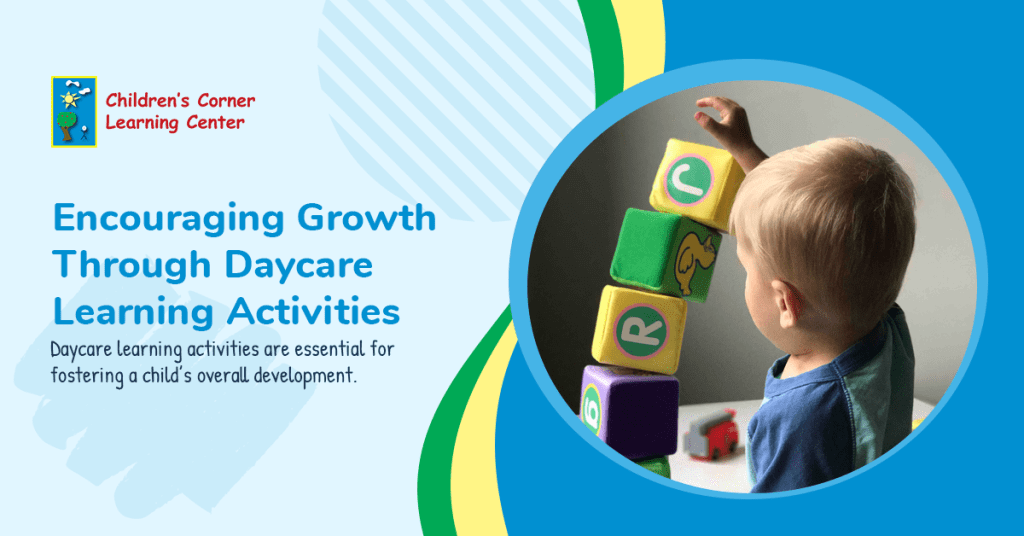
Daycare learning activitiesare essential for fostering a child’s overall development. They blend play with education in ways that engage and excite young learners. These activities are carefully designed to support cognitive, social, and emotional growth, laying the foundation for future success. By encouraging exploration, creativity, and curiosity, daycare learning activities help children reach important developmental milestones while having fun.
The Role of Play-Based Learning in Child Development
Play is a child’s natural way of learning, and daycare programs use this as a foundation to promote growth. Children develop critical thinking, problem-solving, and social skills through structured and unstructured play in a relaxed and enjoyable environment.
Key components of play-based learning include:
- Pretend play: Activities like playing house or acting out a story encourage creativity and social interaction.
- Building with blocks: This improves spatial awareness, logical thinking, and fine motor skills.
- Outdoor exploration: Nature walks and outdoor games stimulate curiosity and promote physical activity.
These approaches make learning enjoyable and foster a love for discovery that benefits children throughout their educational journey.
Examples of Daycare Learning Activities That Foster Creativity
Daycares offer a variety of activities that inspire creativity and allow children to express themselves. These exercises are vital for helping kids develop confidence and a sense of individuality.
Examples of creativity-boosting activities include:
- Art projects: Painting, drawing, and crafting allow children to experiment with colors and textures while improving fine motor skills.
- Music and movement: Singing, dancing, and playing simple instruments foster rhythm, coordination, and self-expression.
- Storytime and storytelling: Listening to and creating their own encourages imagination and language development.
Children enhance their creative abilities and build essential cognitive and emotional skills by participating in these activities.
Balancing Fun and Education in Daily Schedules
A well-rounded daycare program combines fun and educational activities to confirm children are engaged and learning. This balance keeps children motivated and excited about their daily experiences.
Daycare learning schedules typically include:
- Circle time: Group discussions or songs that build communication and listening skills.
- Guided activities: Teacher-led exercises, such as sorting games or puzzles, that develop problem-solving abilities.
- Free play: Unstructured time where children choose activities that interest them, fostering independence and decision-making.
This mix of structured and unstructured activities ensures children receive a comprehensive and enjoyable learning experience.
Supporting Child Learning Milestones
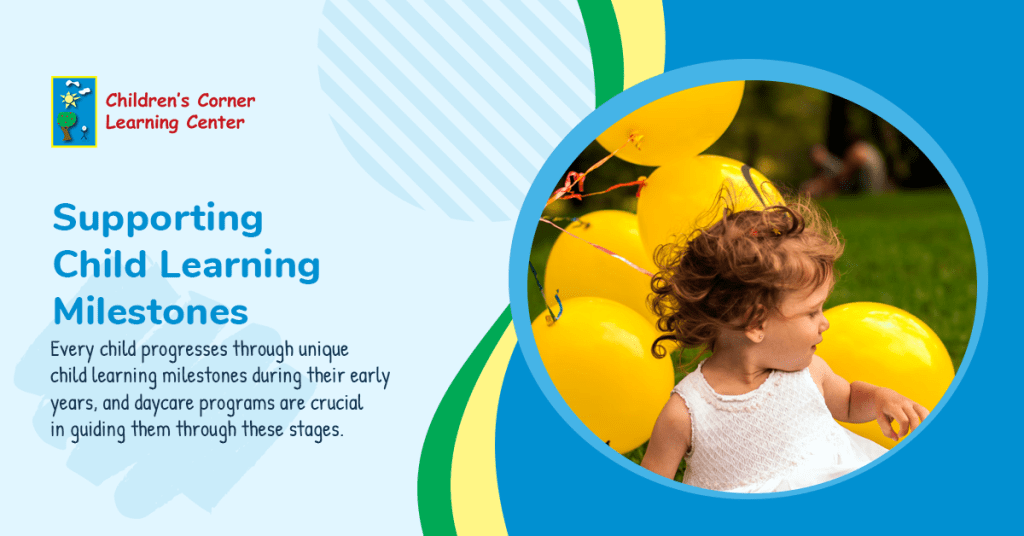
Every child progresses through unique child learning milestonesduring their early years, and daycare programs are crucial in guiding them through these stages. Learning center daycares are designed to provide structured, nurturing environments that foster cognitive, physical, emotional, and social growth. By supporting children as they achieve these milestones, daycares help set the foundation for lifelong success.
Key Milestones Addressed in Learning Center Daycares
Learning milestones vary depending on a child’s age and developmental stage, but all are important building blocks for future growth. Daycares focus on various skills, from motor development to early problem-solving abilities.
Here are some common milestones daycare programs support:
- Gross motor skills: Activities like crawling, walking, or playing on age-appropriate equipment develop coordination and strength.
- Fine motor skills: Crafts, puzzles, and stacking toys enhance hand-eye coordination and dexterity.
- Language development: Singing, storytelling, and interactive conversations expand vocabulary and communication skills.
Daycare programs ensure children develop a well-rounded skill set during their early years by addressing these milestones.
Activities and Approaches That Promote Emotional and Social Growth
Emotional and social milestones are equally essential as physical and cognitive ones. Daycares create opportunities for children to build self-awareness, empathy, and social interaction skills in a safe and supportive setting.
Daycares use these strategies to encourage emotional and social growth:
- Group play activities: Sharing, taking turns, and collaborating during play help children develop teamwork and patience.
- Emotion recognition exercises: Games or stories that identify and discuss feelings teach children how to express themselves and understand others.
- Positive reinforcement: Encouraging words and acknowledgment of accomplishments build self-esteem and confidence.
Through these activities, children learn to navigate relationships and manage emotions, skills that are crucial for success in school and beyond.
Tracking Progress: How Daycares Partner With Parents
Maintaining open communication between daycares and parents is key to supporting learning milestones. This collaboration ensures that children receive consistent support at home and in daycare.
Daycares help parents stay informed about their child’s progress through:
- Daily updates: Reports on meals, naps, and activities keep parents connected to their child’s routine.
- Developmental assessments: Regular check-ins or progress reports highlight achievements and areas for growth.
- Parent-teacher conferences: Opportunities to discuss milestones and set shared goals for the child’s development.
By working together, parents and caregivers can celebrate milestones and address challenges as a team, ensuring the child’s needs are met holistically. Daycare programs are invaluable in helping children reach their learning milestones.
Daycares createan environment where children can grow, learn, and thrive through engaging activities, emotional support, and collaboration with parents. Each milestone achieved is a step toward a brighter future, and daycare plays a vital role in making that journey successful.
Key Takeaways on the Benefits of Enrolling in Our Learning Center
Every milestone your child reaches is a cause for celebration, and enrolling them in a learning center daycare ensures they have the support they need to thrive. From engaging activities to a nurturing environment, daycares help children develop essential skills while fostering curiosity and confidence. These early experiences are the building blocks for their future success, and as parents, you can rest assured knowing they’re in a place that values their growth as much as you do.
Children’s Corner Learning Center is dedicated to helping your child achieve their fullest potential in a safe, loving, and stimulating environment. Ready to see how we can support your family? Book a tour today at https://www.childrenscornergroup.com/book-a-tour/ or call us at (800) 933-7757. Let’s work together to give your child the best possible start in life!

